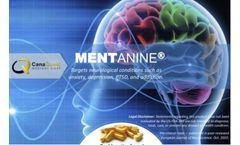Refine by
Depression Articles & Analysis: Older
97 articles found
The first products commercialised freezing point depression technology. Freezing point was a classical method for solute concentration studies in dairy testing. ...
This can result in symptoms such as fatigue, weight gain, cold intolerance, and depression. On the other hand, excessive production of TSH can lead to primary hyperthyroidism, where there is an overactive thyroid gland that produces too much thyroid hormone. ...
The opioid crisis in the United States is a devastating public health issue, with over 70,000 overdose deaths annually, largely driven by the highly potent synthetic opioid fentanyl. The urgency to address this crisis has spurred the development of innovative therapies to prevent and reverse fentanyl overdoses. In this blog, we will explore the groundbreaking preclinical work on CSX-1004, a fully ...
Inflammatory effectors are key cytokines driving major clinical symptoms, like INF-γ inducing fever and hematopoiesis, TNF-α causing fever and depression, and IL-6 contributing to fever, acute kidney injury, and NK cell dysfunction. ...
Opioid-related addiction, overdose and death is a widespread public health crisis. A recent paper published in The Journal of Pharmacology and Experimental Therapeutics by Dr. Renata Marchette working within the National Institute on Drug Abuse Intramural Research Program provides a model example of the how plethysmography can be used to assess ventilatory behavior changes that occur with opioid ...
Mental health is a critical concern for all companies. One in five individuals will experience a mental health problem during their lives, according to the World Health Organization. For many people, the workplace is where mental health problems first begin and/or become exacerbated. ...
Ku Baoshan et al. studied the preparation of tetrahydrocurcumin solid dispersion, and the results also showed that tetrahydrocurcumin and its solid dispersion have anti-depressive effects, which may be related to the monoamine neurotransmitter system. 9.Protective Effect of Renal Function Osawa T et al. found that tetrahydrocurcumin has a better effect than curcumin in improving ...
It has been additionally found to cause systemic inflammation, oxidative stress, and depressed nitric oxide availability that can lead to the manifestation of HFpEF.[5] A consortium of four large community cohorts (the Cardiovascular Health Study, PREVEND, Framingham Heart Study and MESA) assessing 22,681 individuals showed that every 1 standard deviation increase in BMI was ...
Managing emotions, handling life’s stresses, and coping with difficulties in a healthy way—especially during potentially stressful times like the holidays—is a powerful tool for better overall health. 6 tips to help manage emotional wellness during the holidaysExercise Evidence suggests physically active people have lower rates of depression and anxiety ...
Alcohol is a central nervous system depressant, which slows down brain activity, and can make you fall asleep faster than usual. ...
Mental health is a huge focus during the month, as studies have shown that men are statistically far less likely to seek help for things like anxiety and depression. Men seek treatment less frequently for a variety of medical conditions, largely due to a culture that encourages men to be stoic and deal with things themselves. ...
Within the first year of Covid-19, there has been a 25% increase in anxiety and depression worldwide. Not being able to leave the house to socialise with friends, working from home, and being unable to interact face-to-face with extended family has created an environment that allowed mental health issues to enter people’s lives. ...
Carrie Fisher was an American actress most well known for her role as Princess Leia in the Star Wars films (1977-1983 and 2015-2019). She was the daughter of singer Eddie Fisher and actress Debbie Reynolds. Carrie Fisher wrote the semi-autobiographical book Postcards from the Edge and the autobiography Wishful Drinking, which she turned into a one-woman stage show. She was open throughout her ...
Bipolar disorder is a mental disorder characterized by mood swings between mania and depression that can affect daily function. Mania typically involves a person feeling invincible or indestructible and may involve psychosis or hallucinations. ...
Introduction By leveraging Connectomics to trace functional connectivity, seven large-scale brain networks have been identified. These networks have the most dominance over cortical function in the brain, and each serves an overarching common function. While some networks are familiar, many networks, and their constituents, are newly discovered1. These major networks control brain ...
The primary effect of LLLT is a local time response to direct irradiation and includes vasodilatation with increased circulatory flow; increased macrophages and fibroblast activity and improved metabolic function of depressed or damaged cells. Delayed response consists of a systemic effect caused by circulating photoproducts of irradiation in the blood and lymphatic systems. ...
However, stroke can cause changes in libido or the ability to experience an erection or ejaculation. Depression or emotional changes following a stroke can also impact the return to intimacy. ...
The Company is focused on treating neurological conditions, such as epilepsy, anxiety, depression, and Post Traumatic Stress Disorder “PTSD,” including ...
Improve Your Mental Health & Happiness To Increase Recovery Speed Due to a number of biochemical, personal, and social interactions, depression and anxiety may be present in the aftermath of a stroke. Because there is such a prevalence of stroke survivors experiencing chronic arm and hand paralysis, exploring how to support the needs of those living with paralysis is ...
A study shows that adults with spinal cord injuries had a higher incidence, among other things, of adjustment reaction, anxiety disorders, depressive disorders, alcohol and drug dependence. Another study found that spinal cord injuries doubled the risk of mental health problems, with 8.4 percent of spinal cord injury survivors experiencing post-traumatic stress disorder (PTSD). ...















